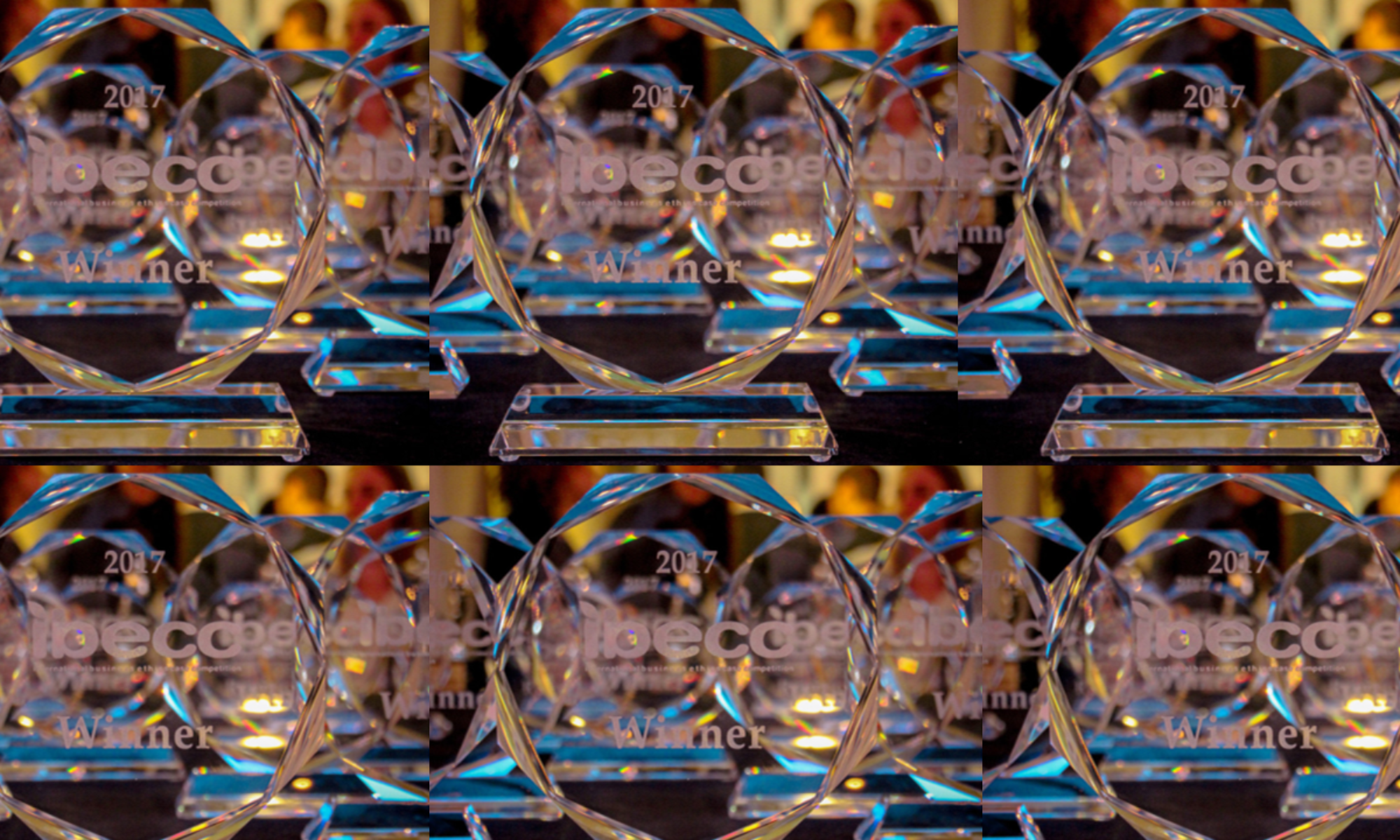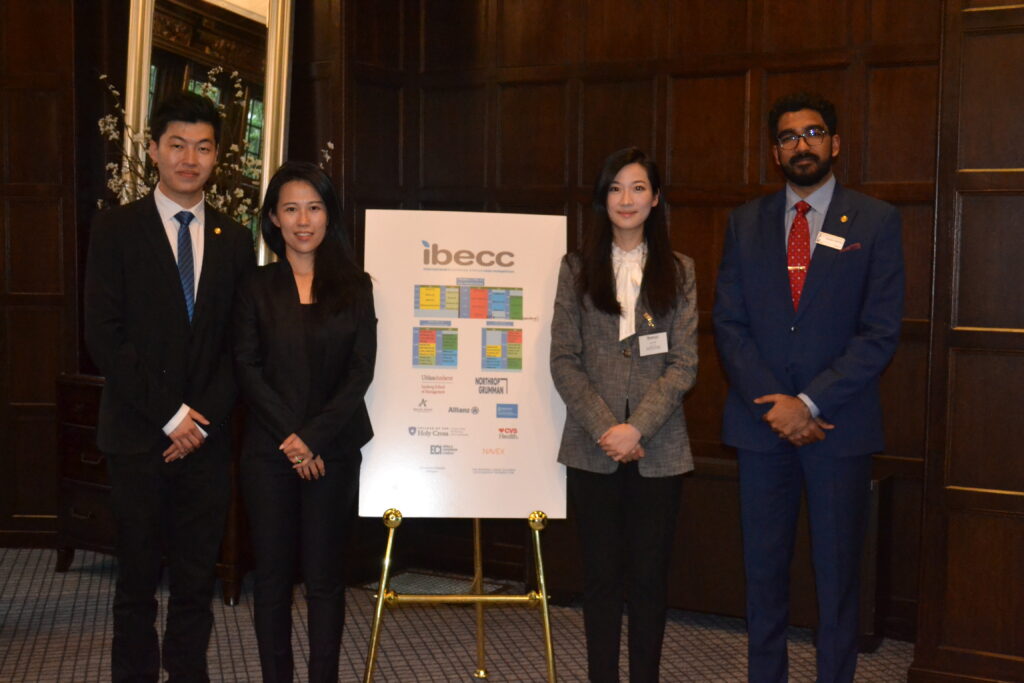IBECC: The International Business Ethics Case Competition
The International Business Ethics Case Competition (IBECC) is the oldest and most distinguished intercollegiate business ethics competition of its kind. IBECC was founded by Thomas I. White and designed with the assistance of Fortune 100 senior executives in 1996. It began as a program at Loyola Marymount University, expanded to include other schools and organizations, and became an independent 501c3 headquartered in Massachusetts in 2019.
OUR MISSION AND GOALS
IBECC: The International Business Ethics Case Competition is an educational event that aims to help all participants become better informed about the necessity, difficulty, costs, and rewards of conducting business ethically. Recognizing the special challenges connected with addressing ethical issues on a multicultural planet, IBECC encourages a secular and philosophical approach to these matters. While we respect the variety of traditions historically connected with ethics, we believe that a philosophical approach offers the greatest hope for agreement across opposing traditions and cultures.
IBECC asks students to identify and research an ethical issue a company or industry is facing. Typically taking the role of a consulting company speaking to a company’s leaders, the team presents an analysis of the legal, financial, and ethical dimensions of the problem and then proposes a solution that works on all three counts.
One of the team’s most important goals is to avoid the mistake of thinking that discussing ethical issues means blaming or shaming the company. Business people are human and, like all of us, make mistakes. The team’s job is to help the company understand where things went wrong and to help it find a way to take corrective action while respecting its legal and financial obligations, living up to its stated values, and advancing the varied interests of the different groups involved. Teams are advised to approach the situation as though they’re advising a friend who’s in a difficult situation. They should be truthful and candid, because sugarcoating the facts and risks doesn’t help. But they should make it clear that their suggestions are made in a spirit of wanting to help. In essence, teams are faced with the challenge of giving bad news in a way that ultimately leads the recipient to say ‘thank you.’ This means that the tone, strategy, and overall approach the team takes in its presentation is crucial to their success.
Teams actually make three different presentations during the competition. (See below for more details.) First, they give a full 25-minute presentation to a panel of corporate judges that is followed by 20 minutes of Q&A. This is followed by feedback from the judges. The second presentation is 10 minutes and focuses solely on the ethical dimension of the problem. The third presentation is 90 seconds and also focuses solely on the ethical issues. It is given by one member of the team who adopts the role of an employee of the company participating in a meeting in which people are discussing the overall problem but have overlooked the ethical issue. The point of the multiple presentations is to prepare students to be able to make a case under varying constraints and conditions.
IBECC is distinctive on a number of fronts. The competition aims to teach students how to discuss ethics in business in a practical, realistic, and effective fashion. Success in IBECC requires excellence in such important skills as team building, research, ethical analysis, and public speaking. Students who compete in IBECC have a strong interest in ethics, so we see them as ideal interns or new hires. One of the most interesting features of IBECC is that teams regularly choose topics that don’t appear in the business press until months later. A few “just over the horizon” topics have included: sub-prime lending, General Motors’ risk of bankruptcy, privacy issues related to social networking websites, piracy in international waters, e-waste dumping in developing nations, health risks of a variety of products, and corruption in FIFA.
THE COMPETITIONS
IBECC consists of three separate, required competitions: a full presentation followed by Q&A and feedback; a 10-minute presentation and a 90-second presentation, plus our optional academic/athletic biathlon.
Full Presentation
Students put together teams of 3 to 5 members and select an appropriate case. Each team prepares a presentation in which students explain the legal, financial and ethical dimensions of the problem. They then recommend a solution that must pass muster on all three counts. Presentations should last roughly 25 minutes and are judged largely by professional corporate ethics and compliance officers.Teams are questioned for an additional 20 minutes by the judges, who then give the teams feedback on their performance. The idea of the exercise is to help students see that it is possible to do business profitably while at the same time act ethically. The format that works best is for a team to think of itself as either an internal or outside consulting group that has been asked by senior management or the Board to analyze the problem and propose a solution.
Ten minute presentation
This presentation focuses solely on the ethical issues and is given by two or three members of the team. We recommend that teams imagine that this presentation is the result of being called back after their full presentation in order to give a shorter presentation strictly about the ethical issues. Teams cannot use slides and there is no Q&A.
Ninety second presentation
This presentation also focuses solely on the ethical issues and is given by one member of the team. We recommend that the speaker imagine that he or she is now an employee at the company and they are at a meeting where people are discussing their topic. However, no one has touched on any of the ethical issues. In 90 seconds, explain to the rest of the people around the table why there are important ethical issues that need to be addressed.
Academic/athletic biathlon competition (optional)
IBECC also includes a unique optional competition that will allow the winning team to designate a charity that will receive a donation in their name. “The World’s Most Intellectually Daunting Biathlon” combines the team’s performance in the 25-minute presentation and a 30 minute run/jog/walk.
Still have questions? Visit the FAQ page.
Brief History and Overview
The International Business Ethics Case Competition is the nation’s oldest event of its kind. It was founded in 1996 by Thomas I. White, Ph.D., the Inaugural Conrad N. Hilton Chair in Business Ethics and Director of the Center for Ethics and Business at Loyola Marymount University in Los Angeles. It was originally designed with the assistance of Fortune 500 senior executives as a classroom exercise at Rider University in New Jersey. When Professor White accepted the Hilton Chair at LMU, he upgraded the exercise to a campus competition. In 1999, other schools were invited; in 2007, the first international school competed; since then, the event has extended its geographic reach In 2008, IBECC partnered with the Ethics & Compliance Officer Association; in 2011, the Opus College of Business at the University of St. Thomas (MN) became a partner, followed in 2015 by the Center for Business Ethics at Bentley University and in 2018 by the Donahue Center for Business Ethics and Social Responsibility.
In 2019, LMU decided to spin off its own competition. IBECC assisted with this and then became an independent 501c3. We are especially grateful to the following organizations that supported IBECC’s 2020, 2021, 2022, and/or 2023 competitions which were held online because of Covid-19: the Abigail Adams Institute; Allianz Life; the Center for Ethics in Society at Saint Anselm College; the Ciocca Center for Business, Ethics and Society at the College of the Holy Cross; CVS; the Donahue Center for Business Ethics and Social Responsibility at the University of Massachusetts Lowell; the Ethics & Compliance Initiative; the Isenberg School of Management at the University of Massachusetts Amherst; Navex Global; the Northrop Grumman Corporation; the Rowena Yarak Schaber Scholarship Foundation; the Sam M. Walton College of Business at the University of Arkansas; and the W. Michael Hoffman Center for Business Ethics at Bentley University. We returned to an in-person event in 2024, hosted by the University of Massachusetts Amherst, Isenberg School of Management. IBECC 2025 is being hosted by San Francisco State University.
IBECC challenges students to learn a variety of practical real-world skills: working on a team; analyzing ethical issues; balancing competing demands (financial, legal and ethical); working under different time constraints; and being evaluated by executives, not faculty. The event also educates judges about the most current ethical issues in business.

